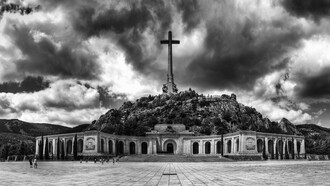We know things are about to change, but do we fully comprehend what is about to happen? Every couple of centuries, human social systems evolve and change. Political and economic systems become outdated and reorganized to meet the new needs of a new era. Throughout history, empires and kingdoms have replaced city-states. Liberal democratic nation-states replace empires and kingdoms. Mercantilism replaces feudalism which is then replaced with liberal capitalism. Industrialization within capitalism drove people from rural agriculture to urban centers for labor in factories. This brought us ideas about Socialism and Communism as a response to abuses of the relationship between labor and capital.
Between these eras, there is often a great war, or a Dark Age followed by a renaissance or enlightenment of new ideas, rediscovered ideas, development, and growth. New systems and -isms arise to meet the new social needs of the day. Today, we know a big change is coming. Robots and AI are replacing labor. Human-induced climate change1 threatens food supplies and biodiversity. It is driving mass migration, competition, and conflict for resources. The era of endless economic expansion and overconsumption is ending. If we have new social needs and limitations different from those of the past, our current social systems will soon become outdated. What is to replace them? Ideas of Circular Economy2, and De-Growth hint at what we must do to survive. We move forward towards new -isms and new political-economic systems we have not yet created.
Challenges for left and right economics in the climate change era
Endless growth is no longer possible on a finite planet. We have reached the Limits of Growth and appear to be entering 75 years of decline in global population and GDP, decreased food production combined with rising sea levels, more frequent natural disasters, and increasing human migration.
We overshoot the capacity of the Earth to regenerate what we take from it to support capitalistic economic activity. With this overconsumption and a claim to the height of modernity, we do not meet global basic human needs. We use 1.7 planet Earth’s worth of resources every year. This is not sustainable.
The Post Carbon Institute describes the coming crash into reality as “The Great Unraveling”3, a description of the perfect storm for the arriving poly-crisis of challenges to our current economic and political systems.
Common folks feel and understand the impacts of capitalistic recessions with an economic contraction of only a few percent. Capitalism requires never-ending growth. When growth is no longer possible, what is to become of liberal capitalism? Today corporations are trying to adapt to save themselves with so-called Sustainable Stakeholder Capitalism and ESG (Environment Social Governance). Corporations attempt to make considerations for People, Planet, and Profit but the underlying goal of exploitation for growth and profit beyond human needs in this framework is never directly required to stop4. This is too little too late as the corporate forces which have destroyed our planetary commons remain yet to be held accountable.
AI and robots are replacing workers. Soon, there will be fewer and fewer required laborers and middle managers to seize the means of production within the frameworks of Socialism and Communism. The current social system ideas we have adopted to organize modern society in collective worker or free market thinking will become as outdated as those that preceded them. The way forward may not be Left or Right. It will simply be Forward.
Sustainability through circular economy, reindustrialization, and de-growth
The future will require production to meet human needs, not profit. Going forward with sustainable living requires two approaches. First, by using less with a focus on basic survival needs over pleasure and indulgence. Second, we will use technological advances to de-industrialize our economy away from disposable products using fossil fuels. We then shift the production to essential items using renewable energy sources. This new need-based production will focus on the Circular Economic concepts of Re-Use, Re-Purpose, Recycle, and Right-To-Repair. Here, the planned obsolescence of models to generate replacement purchasing is no longer permitted. Instead, consumers will rent, use, and return. Recycling, repurposing, and repairing are now the responsibility of the producer, not the consumer. Production and economic activity then become a stable circular model of defined size with limited resource use instead of growth through a consumption, disposal, and replacement model.
Economic change during environmental chaos will bring political changes
The shock of rapid change will bring the possibility of many futures. Masses of migrants and unemployed in a world of climate chaos, robots, and AI will require new ideas about income, taxes, and social equality. Political systems will be strained under these pressures. New eras always transition from old eras. There are ideas we can draw on from our current era framed by left and right thinking that governments may lean on during the transition to a new era. They could go in two different directions.
First, centralization would permit elites to direct societal resources by need instead of by using market forces alone. Strong guidance, subsidies, and regulation could provide structures for the transition to a Circular and Sustainable Degrowth economy.
The COVID lockdowns taught us people can work from home without driving fossil-fueled cars. Governments can issue payments to citizens. Providing a Universal Basic Income to the masses in a new economy of robots, AI, scaled-down production volume, and routine shocks caused by environmental chaos may be essential to preserving social stability.
The danger here is a return to fascism5 if populations cheer for authoritarianism and in-ward nationalism to “preserve order” by criminalizing poverty, dissent, refugees, and “others”. A withdrawal from international cooperation to preserve national interests over common human needs could cause a rise in global conflicts and competition over resources. Rich nations will overrun poor nations as refugees flee in droves. Wealthy and militarized nations fighting each other would incur large-scale deaths.
Second, some areas of the world may decentralize with expansions in local democracy. The focus would shift to local sourcing, specialization, and direct democratic production direction with a rejection of globalization. They could prioritize sustainable food production and housing over weaponry. Mutual aid and internationalism could drive trade over market forces. Simpler ways of life found in previous agricultural societies could return on a large scale. Western thought about using modernization to conquer nature can instead transpose to Eastern and indigenous ideas about living in harmony with nature.
A third path could be chaos and civil conflict which drives nations into a new ungovernable Dark Age. Lawlessness, looting, fanaticism, and killing sprees are real risks in periods of disorder. The Great Unraveling would be upon us. Reduced living standards, lower quality of life, and the erosion of rights, healthcare, and education could damage multiple generations before a new stabilizing consensus takes shape on how survivors will form a new society.
One era ends and a new era begins
As the world breaks down, there won’t be one right or left path to something new. Different parts of the world will have different experiences as new ideas come forward to meet new social needs. Homogeneous and diverse cultural societies may find different levels of cooperation or internal conflict. Centralization, decentralization, and social chaos will play roles in various ways and locations until a new consensus forms. Liberal capitalism and industrialization for profit will end. Endless expansion and exploitation are no longer possible. Human needs and survival will drive new social system structures to go forward. Circular Economy, De-Growth, and Sustainable systems will alter our current Political Economy. Required social evolution will challenge and replace our current ideas about left and right organization. The new dominant -ism design to guide society is still to come. We are moving forward into a new era. We just don’t know what it is yet.
References
1 https://www.clubofrome.org/blog-post/dunlop-spratt-global-warming/
2 https://www.ellenmacarthurfoundation.org/the-circular-economy-in-detail-deep-dive
3 https://www.postcarbon.org/publications/welcome-to-the-great-unraveling/
4 https://greenpathrecovery.com/blog/people-planet-profit-not-triple-bottom-line/
5 https://www.penguinrandomhouse.com/books/586030/how-fascism-works-by-jason-stanley/














